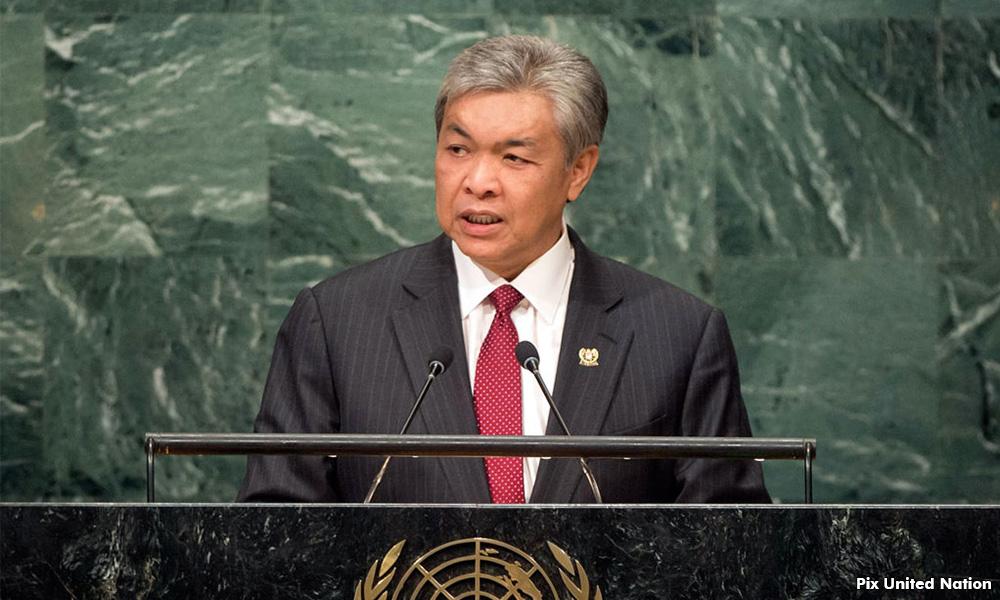MP SPEAKS There is one nagging question with regard to the presence of foreign fighters in Malaysia - one that has escaped attention in the Malaysian Parliament, as well as in the media.
Why do Malaysian Muslims leave for battle in the Middle East at over six times the rate than Muslims in Indonesia? That Malaysia has a disproportionately high level of foreign fighters per capita is an observation established by Dr Sidney Jones, director of the Institute for Policy Analysis of Conflict.
For example, an October 2016 study by Jones demonstrates that pro-Islamic State (IS) groups in Mindanao have deepened cooperation with their connections in Malaysia.
Specifically, Abu Sayyaf has a faction based in Basilan, an island province of the Philippines. Here, a number of foreign fighters - the majority of whom are Malaysians - have joined the militant group who have pledged their allegiance to IS.
These are questions that must rightly be addressed, with adequate allowance for rigorous scrutiny in Malaysia's August house - not shut from view nor discussion.
 Indeed, the dangerous levels of foreign fighters should be the RM2.6 billion question that must be answered by our Deputy Prime Minister Ahmad Zahid Hamidi, as he delivers his keynote speech, titled "De-Rooting Radicalism and Extremism", at the Oxford Centre for Islamic Studies (OCIS) at Oxford University, United Kingdom, tomorrow.
Indeed, the dangerous levels of foreign fighters should be the RM2.6 billion question that must be answered by our Deputy Prime Minister Ahmad Zahid Hamidi, as he delivers his keynote speech, titled "De-Rooting Radicalism and Extremism", at the Oxford Centre for Islamic Studies (OCIS) at Oxford University, United Kingdom, tomorrow.
After all, wasn’t the RM2.6 billion donation to our prime minister a gift from Saudi Arabia, in support of our government’s effort to counter terrorism?
Instead of having sufficient avenues of disclosure in Parliament, we are forced to be subjected to the ongoing government-condoned parade of polarisation of race and religion in Malaysia.
Clearly, the failure to lead has rendered the BN government hardly qualified to be an authoritative voice on the eradication of religious radicalism and acts of extremism.
In June this year, Pahang mufti Abdul Rahman Osman labelled DAP as “kafir harbi”, a term easily construed as non-believers who can be slain, for disagreeing on moves to empower the syariah (Islamic law).
Last month, the Department of Islamic Development (Jakim) asked for a name change for “hot dogs” as such a name would “confuse” Muslims. Two months before that, the Kedah mufti declared the mobile game PokemonGo as “haram” because the act of catching Pokemon characters could be misconstrued as “magic” and would therefore be a threat to Muslims.
A society whose spirituality in Islam is so easily corrupted by mere food names and fictional characters is not a sign of strength that can fend away extremism.
 The government has been inept in quelling incendiary sentiments. Recently, Umno Sungai Besar division chief Jamal Md Yunos led red-shirt bearers to trample at the premises of Malaysiakini, over admissions that the news portal receives funding from the George Soros-supported Open Society Foundations.
The government has been inept in quelling incendiary sentiments. Recently, Umno Sungai Besar division chief Jamal Md Yunos led red-shirt bearers to trample at the premises of Malaysiakini, over admissions that the news portal receives funding from the George Soros-supported Open Society Foundations.
These protesters remain unruly, when in contrast, Malaysiakini is being probed under Section 124C of the Penal Code for allegedly trying to “undermine parliamentary democracy”.
Government’s eerie silence
The government’s eerie silence towards the red-shirt protesters condones the proliferation of outrageous conspiracy theories that Malaysiakini is working towards toppling the present government, while muzzling the victim and other segments of society from shedding light on the issue.
The Malaysian government is of the view that oppression overcomes political differences. Last week, Zahid announced proudly, “As was decided by me in the Dewan Rakyat yesterday, Bersih 5 and the red-shirts are disallowed from holding any gatherings.”
Zahid’s honour to be the inaugural speaker at the newly-built auditorium of the Oxford Centre for Islamic Studies (OCIS) comes at great cost back home. In total, Malaysia has contributed RM64.5 million to the construction of OCIS - wherein RM12 million was spent “especially for the wood carvings for its interior decoration”, while the remaining £10 million (RM52.5 million) has been expended on the completion of the OCIS building. This incongruity in expenditure is not lost on the Malaysian society.
While the government spends lavishly on outstanding, foreign universities, it scrimps on our local universities. Next year, our 20 public universities are expected to run their daily operations with a total of RM6.12 billion, that is a 19.23 percent cut from the RM7.57 billion allocation in 2016, or a 30 percent markdown from the RM8.75 billion allocation in 2015.
Two months ago, Robert Reich, secretary of labour in Bill Clinton’s administration, spoke at the Times Higher Education World Academic Summit, delivering a poignant speech on the crisis in public education afflicting universities of the United States. The continual slide in public funding for tertiary education has impeded the attendance of students from low-income families in universities.
“If our country continues to disinvest, we will be abandoning an essential feature of democracy. This is what is at risk: the means to educate the broadest possible swath of our society, for the betterment of society, with full public support,” said Reich.
Local universities lose huge chunks
Granted, the public policy expert had the best interests of US universities in mind, but these are lessons that Malaysia - as a country that has been relentlessly slashing higher education budgets - too can learn from.
Lest we forget, the 11th Malaysia Plan (11MP) clearly targeted that for each family that falls under the Bottom 40 percent of our nation, there will be one graduate in tertiary education.
Unfortunately, Malaysia's gift of RM64.5 million to OCIS takes huge chunks from the operating budgets of at least four severely affected universities - University Malaysia Kelantan (-RM25.58 million), University Malaysia Perlis (-RM22.25 million), Universiti Malaysia Pahang (-RM10.56 million), University Tun Hussein Onn Malaysia (-RM11.25 million).
Funding research to contribute to the global study of Islam is important, but it must not come at the expense of providing quality education to develop the hearts and minds of our youth. After all, the method of prioritising needs (fiqh al awlawiyat) is the cornerstone of Sheikh Yusuf Al Qardhawi's governing principle. We certainly must always prioritise the education of the next generation.
Come tomorrow, Zahid’s speech on "De-Rooting Radicalism and Extremism" will seem contrived, at best.
It comes at the deprivation of quality higher education for our local students when mammoth transfers of funds to an already established institution is contrasted with the revocation of scholarships of 744 young Malaysians - some of whom were offered placements in Oxford, having their dreams quashed.
Secondly, time and time again, our government has proven to be increasingly authoritarian, rolling out new legislations such as the Prevention of Terrorism Act, Security Offences (Special Measures) Act, and the National Security Council Act while also tightening the Sedition Act, which disrespects our fundamental human rights as enshrined in the Federal Constitution.
These laws ostensibly help us in rooting out terrorists - but how can we know for sure, when parliamentary deliberations are opaque in disclosure on issues affecting national security. The numbers adduced by Sidney Jones certainly provide much room for concern.
Democracy and educational empowerment are the best defence against terrorism. Sadly, Zahid’s speech on deradicalisation and overcoming extremism, if reflective of his measures in Malaysia, will only reek of authoritarianism.
The test of leadership is to lead by both words and deeds; and for the citizens to demand as such when clearly both the words and deeds of our government reflect authoritarianism that shrinks the democratic space and further pushes marginalised voices to the fringes of extremism.
NURUL IZZAH ANWAR is the MP for Lembah Pantai and a vice-president of PKR.

